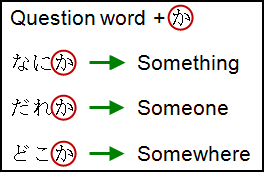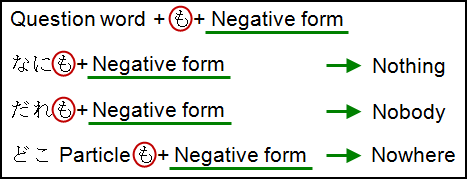- Home
- Basic Lessons
- Japanese Particles ka and mo
Japanese Particles か (ka) and も (mo)
with Question Words -
Free Japanese Lessons: 15
Japanese particles か (ka) and も (mo) can combine with the question words to form other words in Japanese.
So far you have already known that the question words for 'what', 'who' and 'where' in Japanese are なに (nani), だれ (dare) and どこ (doko) respectively.
If you add the Japanese particle か (ka) to なに (nani), だれ (dare) and どこ (doko), the Japanese words for 'something' - なにか (nanika), 'someone' - だれか (dareka) and 'somewhere' - どこか (dokoka) are formed respectively.
When you are forming sentences with the above 3 words, some of them require particle while some do not require. The rule is as follow...
Question word + か
| Formation | Meaning | Require particle? |
| なにか | something | No |
| だれか | someone | No |
| どこか | somewhere | Yes |
What does the above rule mean? Let's use some examples to show.
'Something' - なにか (nanika)
Usually when you are asking something using the question word なに (nani)...
- Question: あなたはなに を のみますか。
anata wa nani wo nomimasu ka
Meaning: What are you going to drink? (The speaker already know that the listener wants to drink something)
- Answer: わたしはコーヒー を のみます。
watashi wa ko-hi- wo nomimasu
Meaning: I will drink coffee.
However if you are to use 'something' なにか (nanika) in the above question...
- Question: あなたは なにか のみますか。
anata wa nanika nomimasu ka
Meaning: Are you going to drink something? (The speaker does not know if the listener wants to drink or not)
- Answer: はい、
わたしはなにかのみます。コーヒーを のみます。
hai,watashi wa nanika nomimasu.ko-hi- wo nomimasu
Meaning: Yes,I will drink something.I will drink coffee.
You can see that when using the word 'something' なにか (nanika) in the above question, you do not need the Japanese particle を (wo), and the question becomes a Yes/No question (question requires you to answer yes or no).
When answering the above question, you can omit the part on "I will drink something". You just need to say what you are going to drink.
'Someone' - だれか (dareka)
Similarly if you are asking something using the question word だれ (dare)...
- Question: きょうしつにだれ が いますか。
kyoushitsu ni dare ga imasu ka
Meaning: Who exist in the classroom? (The speaker already knows that someone is in the classroom)
- Answer: きょうしつにせんせい が います。
kyoushitsu ni sensei ga imasu
Meaning: Teacher is in the classroom.
However if you are to use 'someone' だれか (dareka) in the above question...
- Question: きょうしつに だれか いますか。
kyoushitsu ni dareka imasu ka
Meaning: Is there someone in the classroom? (The speaker does not know if there is someone in the classroom or not)
- Answer: はい、きょうしつにせんせい が います。
hai, kyoushitsu ni sensei ga imasu
Meaning: Yes, teacher is in the classroom.
When you are using the word 'someone' だれか (dareka) in the above question, you do not need the Japanese particle が (ga), and the question becomes a Yes/No question.
'Somewhere' - どこか (dokoka)
If you are asking something using the question word どこ (doko)...
- Question: あしたどこ へ いきますか。
ashita doko e ikimasu ka
Meaning: Where are you going tomorrow? (The speaker already know that the listener is going somewhere)
- Answer: あしたがっこう へ いきます。
ashita gakkou e ikimasu
Meaning: I am going to school tomorrow.
However if you are to use 'somewhere' どこか (dokoka) in the above question...
- Question: あした どこか へ いきますか。
ashita dokoka e ikimasu ka
Meaning: Are you going somewhere tomorrow? (The speaker does not know if the listener is going out or not)
- Answer: はい、あしたがっこう へ いきます。
hai, ashita gakkou e ikimasu
Meaning: Yes, I am going to school tomorrow.

As you can see, different from 'something' and 'someone', even when you are using 'somewhere' どこか (dokoka) in the above question, you still need the Japanese particle へ (e), and the question has become a Yes/No question too.
All the above examples have shown whether Japanese particles are required when you are forming sentences using the words 'something', 'something' and 'somewhere'.
Question Words with Japanese Particle も (mo)
Instead of adding the particle か (ka), if you add the particle も (mo) to なに (nani), だれ (dare) and どこ (doko), the Japanese words for 'nothing' - なにも (nanimo), 'nobody' - だれも (daremo) and 'nowhere' - どこPも (doko P mo) are formed respectively.
When you are forming sentences with the above 3 words, some of them require particle while some do not.
And all these 3 words have to be used together with the negative form sentences. The rule is as follow...
Question word + も + Negative form
| Formation | Meaning | Require particle? |
| なにも + Negative form | nothing | No |
| だれも + Negative form | nobody | No |
| どこ (Particle) も + Negative form | nowhere | Yes |
However, if どこも (dokomo) is used (without the particle) together with positive form sentence, it can mean the opposite - 'everywhere' or 'anywhere'. The rule is...
どこ + も + Positive form
| Formation | Meaning | Require particle? |
| どこ も + Positive form | everywhere | No |
Again let's use some examples to show what the above rules mean...
'Nothing' - なにも (nanimo)
- Question: あなたは なにか のみますか。
anata wa nanika nomimasu ka
Meaning: Are you going to drink something?
- Answer: いいえ、[わたしは] なにも のみません。
iie, [watashi wa] nanimo nomimasen
Meaning: No, I will drink nothing.
As you can see from the above answer, when you are using the word 'nothing' なにも (nanimo), you do not need the Japanese particle を (wo) and the sentence need to be in negative form.
The square bracket [ ] indicates that the words inside the bracket are optional.
'Nobody' - だれも (daremo)
When you are using the word 'nobody' だれも (daremo)...
- Question: きょうしつに だれか いますか。
kyoushitsu ni dareka imasu ka
Meaning: Is there someone in the classroom?
- Answer: いいえ、[きょうしつ には] だれも いません。
iie, [kyoushitsu niwa] daremo imasen
Meaning: No, there is nobody in the classroom.
When you are using the word 'nobody' だれも (daremo) in the above answer, you do not need the Japanese particle が (ga) and the sentence need to be in negative form.
'Nowhere' - どこ + Particle + も (doko Particle mo)
When you are using the word 'nowhere' どこ + Particle + も (doko Particle mo)...
- Question: あした どこか へいきますか。
ashita dokoka e ikimasu ka
Meaning: Are you going somewhere tomorrow?
- Answer: いいえ、[あした は] どこへも いきません。
iie, [ashita wa] dokoemo ikimasen
Meaning: No, I am going nowhere tomorrow.

As you can see from the above answer, when you are using the word 'nowhere' どこ + Particle + も (doko Particle mo), you still need the Japanese particle へ (e) (in this case), and the sentence need to be in negative form.
'Everywhere' - どこも (dokomo) + Positive form
Note that どこも (dokomo) can mean 'everywhere' or 'anywhere' if it's used together with positive form sentence.
- どこも こんでいます。
dokomo konde imasu
Meaning: Everywhere is crowded.
- ホテルは どこも よやくでいっぱいです。
hoteru wa dokomo yoyaku de ippai desu
Meaning: The hotels were all booked.
If you want to know more about Japanese particles, I recommend you get one of these books on particles.
Related Pages
Lesson 11: Particles.
Lesson 14: Particles Change in Negative Answers.
Lesson 16: Particles to and de.
Lesson 24: Particles wa and ga.
Lesson 27: Particle to for Quotation.
Intermediate Lesson 14: Particle ga for Introduction.
Intermediate Lesson 18: Particle de with more functions.
Best Deal of the Year! Get 68% OFF Lifetime Premium! Ends on 13 Dec 2025
Click Here to Get 68% OFF Lifetime Premium and be on the fast track to fluency in Japanese.
The link above is an affiliate link, which means that I would earn a commission (at no extra cost to you) if you do end up purchasing the related learning course.
Previous - Lesson 14: Particles Change
Buy me a coffee









Facebook Comments
Don’t see the comments box? Log in to your Facebook account, give Facebook consent, then return to this page and refresh it.